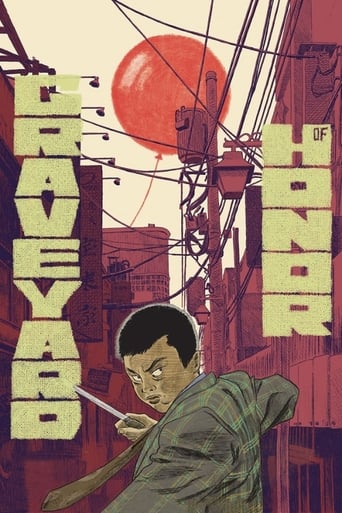Woodyanders
Unhinged and unpredictable renegade yakuza gang member Rikio Ishikawa (an excellent and intimidating portrayal by Tetsuya Watari) gets banished to Osaka because of his crazy and violent conduct. Only young courtesan Chieko (a fine and sympathetic performance by the lovely Yumi Takigawa) gives Rikio any shelter and support as his self-destructive behavior compounds the severity of his situation. Director Kinji Fukasaku relates the gripping story at a brisk pace, offers a fascinating and illuminating exploration of the Japanese mobster criminal underground and their strict code of honor, deftly uses a mock documentary newsreel style to give the narrative a strong sense of historical accuracy and authenticity, stages the exciting action with rip-roaring brio, and maintains a tough gritty tone throughout. The startling moments of savage violence pack a ferocious punch. However, it's the stark and unwavering way this film presents the main character as a real nasty and irredeemable bastard whose raging temper and fierce nature make him a constant threat to everyone around him including and especially himself that gives the plot its an extra potent nihilistic edge; Rikio is the sort of horrible person who just couldn't get out of his own way and thus was doomed to meet a harsh untimely end. Hanjiro Nakazawa's wild widescreen cinematography boasts loads of insane tilted camera angles and funky occasional use of sepia and freeze frames. Toshiaki Tsushima's rousing score hits the stirring spot. A blistering portrait of a dangerous psycho.
valis1949
Don't be misled. GRAVEYARD OF HONOR is not your typical Japanese Yakuza film. This genre most often depicts a battle between Good and Evil, or at the very least, the awareness of this struggle. Kinji Fukasaku, director of GRAVEYARD OF HONOR, has created a portrait of a character who is not cognizant of a single redeemable quality. Tetsuya Watari plays Rikio Ishikawa who was a real figure within the Japanese underworld in the years immediately following WWII. This man was clearly psychotic and was not to be restrained or regulated either by the police or leaders within his Yakuza brotherhood. Fresh out of jail, and then banished for attacking his own clan leader, he is sent to Osaka where he acquires a heroin habit. And, all along this downward slide, it is nearly impossible to generate any sympathy whatsoever for this reprehensible character. Fukasaku seems to suggest that US occupying forces were in some ways complicit in the corruption of post WWII Japan. As the US attempted to bolster Japanese self rule, it allowed the Yakuza's fortunes to prosper in phony democratic elections. However, in no way does this allow the viewer to empathize with the sadistically violent outbursts of Rikio Ishikawa. Kinji Fukasaku has crafted a film in which we watch as a malevolent anti-hero voraciously embraces the forces of darkness without a backwards glance.
chaos-rampant
The bittersweet irony of Fukasaku was that he was a talented man that only became known to us through his last film. So it's enthralling to discover small gems like this when in the West we were praising Scorsese for his grittiness.It helps to know a bit about this type, the yakuza film. Fukasaku's The Yakuza Papers series offer all the introduction you're going to need. If you are acquainted this will come as a pleasant surprise. The plot is nowhere near as convoluted, the barrage of constant name-dropping that made the former occasionally hard to follow is absent. Instead we get the distilled energy, with hand-held cameras peering from the most improbable angles, filming the numerous fights not from a distance but in the middle of the swirl. We get stills, narration, clever use of sepia, fast forwards and so on, years before Tarantino made it cool. Yet what sets Graveyard of Honour apart from other yakuza movies is the protagonist. He's not the typical rags to riches and back figure seen in gangster movies. He doesn't hit the good time before falling down, he's not Tony Montana. No, it's all down-hill for him; a self-destructive yakuza without a care in the world who brings about his own misery and challenges his bad karma at every corner. His nihilistic stare reminded me of Ryonosuke Tsukue from Sword of Doom.Strongly recommended for crime drama fans.
Montgomery Sutton
Graveyard of Honor is a fantastic entry into the yakuza genre or, for that matter, the gangster genre in general. However, more so than many of its counterparts, it is an excellent Brechtian character study. Filmed in a "mockumentary" style, Graveyard of Honor breaks up its action and storytelling relatively often with bits of narration, setting the events of the film in their period context and transitioning over long gaps in time.A reviewer once equated this film to the "blacksploitation" films of the same period: this betrayed the reviewer's ignorance to the genre. The Japanese gangster film is far more presentational than its western counterparts. From the bright, red, paint-like blood to the strict characterizations and operatic emotions, Graveyard of Honor and other films like it are a sort of midway point between Kabuki theater and French nihilism. It is an intriguing genre, and one that internationally acclaimed director Kinji Fukasaku uses brilliantly to pose intriguing questions and point out crucial problems in the Japanese mindset of the time.To truly appreciate his 1970s yakuza films, it helps to have knowledge of the history leading up o that time from the end of World War II. Watching Graveyard of Honor on its own will certainly be an entertaining experience, but anyone perplexed or intrigued by the film should do research on other films of the period, their cultural context, and their societal implications. Fukasaku was a groundbreaking director, and it's a shame that his brilliance could be lost in the cultural gap.



